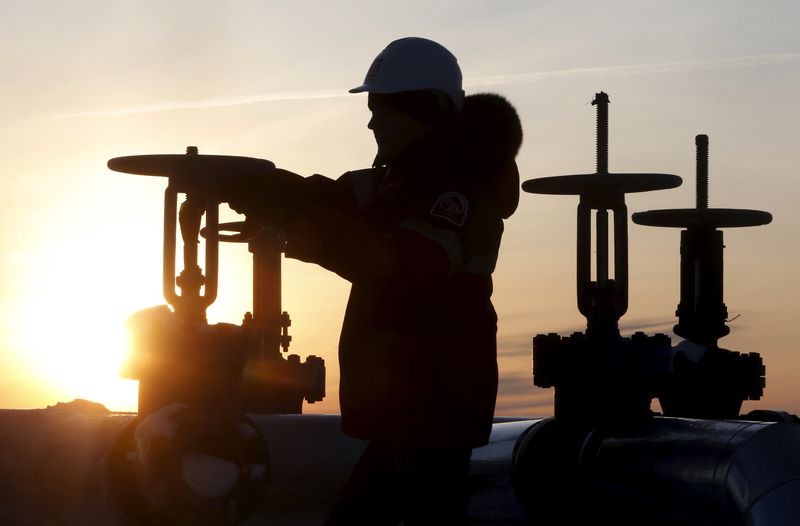* Surging infection rates stoke demand concerns
* U.S. reports daily record in new coronavirus cases
* OPEC+ to add supplies by easing output curbs
(Updates prices, adds comment)
By Shadia Nasralla
LONDON, July 17 (Reuters) - Oil prices were broadly stable
on Friday in early U.S. trading, as expectations of stimulus
programmes balanced concerns about the recovery in fuel demand
as coronavirus cases surged, while major crude producers
prepared to lift output.
Brent crude futures LCOc1 fell 15 cents to $43.22 a barrel
by 1350 GMT. U.S. West Texas Intermediate (WTI) crude CLc1
dropped 5 cents to $40.70. Both contracts were on track to
remain broadly flat over the week.
The United States reported at least 75,000 new COVID-19
cases on Thursday, a daily record. Spain and Australia reported
their steepest daily jumps in more than two months, while cases
continued to soar in India and Brazil. Meanwhile, lawmakers in the United States and in the
European union are set to debate the next tranches of economic
stimulus programmes over the coming days.
"While virus cases remain on the rise in providing an upside
price limiter, expectations for some additional congressionally
driven stimulus appear to be offering support to the equities
that is spilling into the oil space," said Jim Ritterbusch of
U.S.-based energy consultants Ritterbusch and Associates.
The benchmark crudes had fallen 1% on Thursday after the
Organization of the Petroleum Exporting Countries and its
allies, a group known as OPEC+, agreed to trim record supply
cuts of 9.7 million barrels per day (bpd) by 2 million bpd,
starting in August.
The actual rise would be closer to 1 million bpd because
Iraq and other countries, which produced more than their quota
from May to July, would make extra cuts in August and September,
said Vivek Dhar, commodities analyst at Commonwealth Bank of
Australia. "With more production coming online from August, a dip in
demand can really play a pivotal role in pushing recovering
prices back to lower levels," said Rystad oil markets analyst
Louise Dickson.
"At this stage it looks like a quick demand recovery this
year is not really on the table any more, and with it a quick
price recovery," she said.
- English (USA)
- English (UK)
- English (India)
- English (Canada)
- English (Australia)
- English (South Africa)
- English (Nigeria)
- Deutsch
- Español (España)
- Español (México)
- Français
- Italiano
- Nederlands
- Português (Portugal)
- Polski
- Português (Brasil)
- Русский
- Türkçe
- العربية
- Ελληνικά
- Svenska
- Suomi
- עברית
- 日本語
- 한국어
- 简体中文
- 繁體中文
- Bahasa Indonesia
- Bahasa Melayu
- ไทย
- Tiếng Việt
- हिंदी
UPDATE 4-Oil prices broadly stable as stimulus hopes balance corona fears
Published 07/17/2020, 02:13 PM
Updated 07/17/2020, 10:10 PM
UPDATE 4-Oil prices broadly stable as stimulus hopes balance corona fears

Latest comments
Install Our App
Risk Disclosure: Trading in financial instruments and/or cryptocurrencies involves high risks including the risk of losing some, or all, of your investment amount, and may not be suitable for all investors. Prices of cryptocurrencies are extremely volatile and may be affected by external factors such as financial, regulatory or political events. Trading on margin increases the financial risks.
Before deciding to trade in financial instrument or cryptocurrencies you should be fully informed of the risks and costs associated with trading the financial markets, carefully consider your investment objectives, level of experience, and risk appetite, and seek professional advice where needed.
Fusion Media would like to remind you that the data contained in this website is not necessarily real-time nor accurate. The data and prices on the website are not necessarily provided by any market or exchange, but may be provided by market makers, and so prices may not be accurate and may differ from the actual price at any given market, meaning prices are indicative and not appropriate for trading purposes. Fusion Media and any provider of the data contained in this website will not accept liability for any loss or damage as a result of your trading, or your reliance on the information contained within this website.
It is prohibited to use, store, reproduce, display, modify, transmit or distribute the data contained in this website without the explicit prior written permission of Fusion Media and/or the data provider. All intellectual property rights are reserved by the providers and/or the exchange providing the data contained in this website.
Fusion Media may be compensated by the advertisers that appear on the website, based on your interaction with the advertisements or advertisers.
Before deciding to trade in financial instrument or cryptocurrencies you should be fully informed of the risks and costs associated with trading the financial markets, carefully consider your investment objectives, level of experience, and risk appetite, and seek professional advice where needed.
Fusion Media would like to remind you that the data contained in this website is not necessarily real-time nor accurate. The data and prices on the website are not necessarily provided by any market or exchange, but may be provided by market makers, and so prices may not be accurate and may differ from the actual price at any given market, meaning prices are indicative and not appropriate for trading purposes. Fusion Media and any provider of the data contained in this website will not accept liability for any loss or damage as a result of your trading, or your reliance on the information contained within this website.
It is prohibited to use, store, reproduce, display, modify, transmit or distribute the data contained in this website without the explicit prior written permission of Fusion Media and/or the data provider. All intellectual property rights are reserved by the providers and/or the exchange providing the data contained in this website.
Fusion Media may be compensated by the advertisers that appear on the website, based on your interaction with the advertisements or advertisers.
© 2007-2024 - Fusion Media Limited. All Rights Reserved.